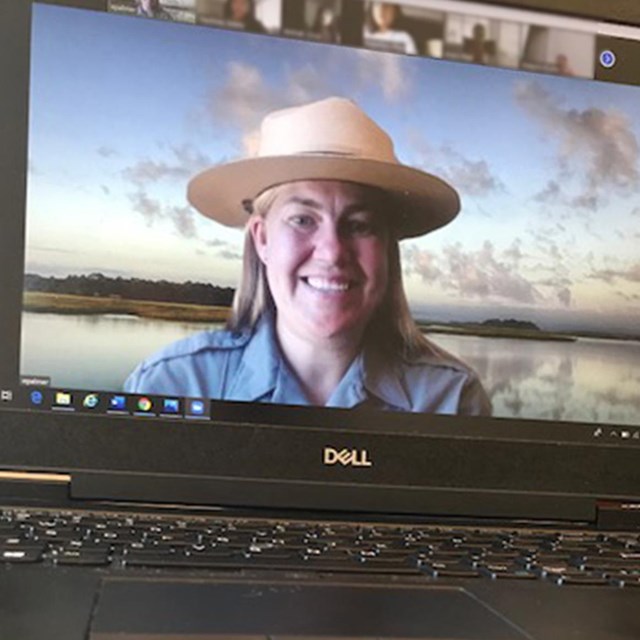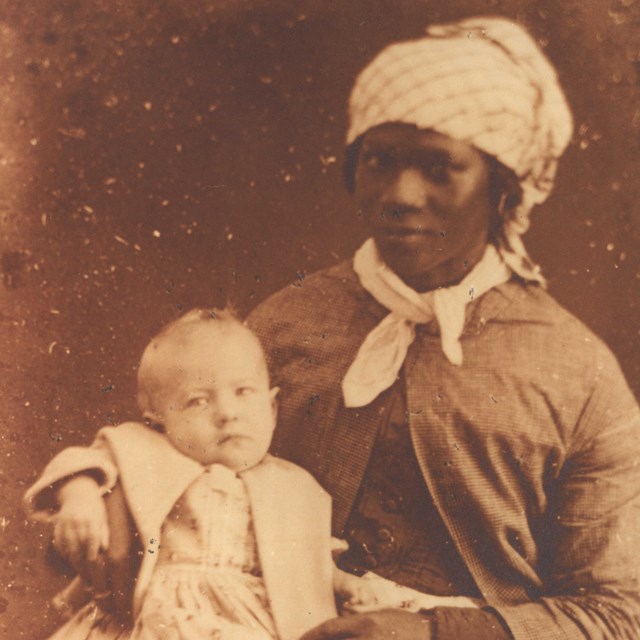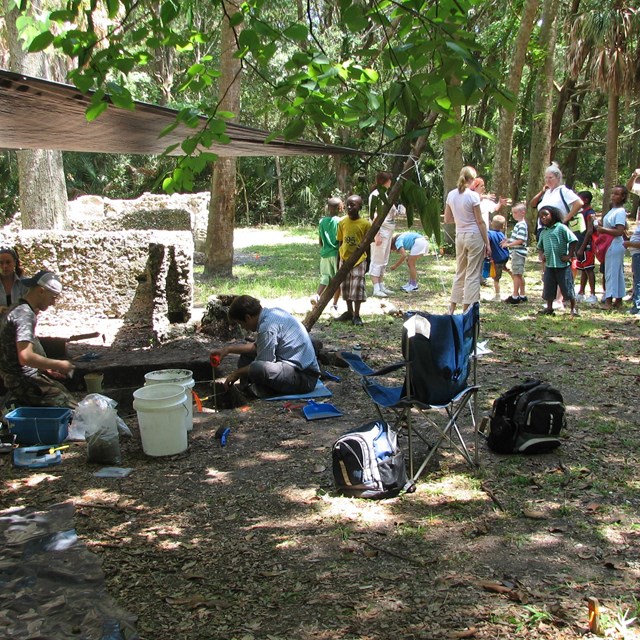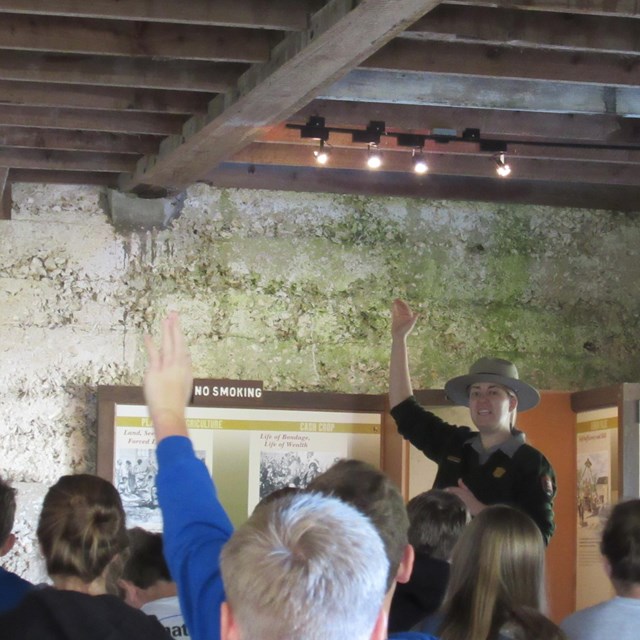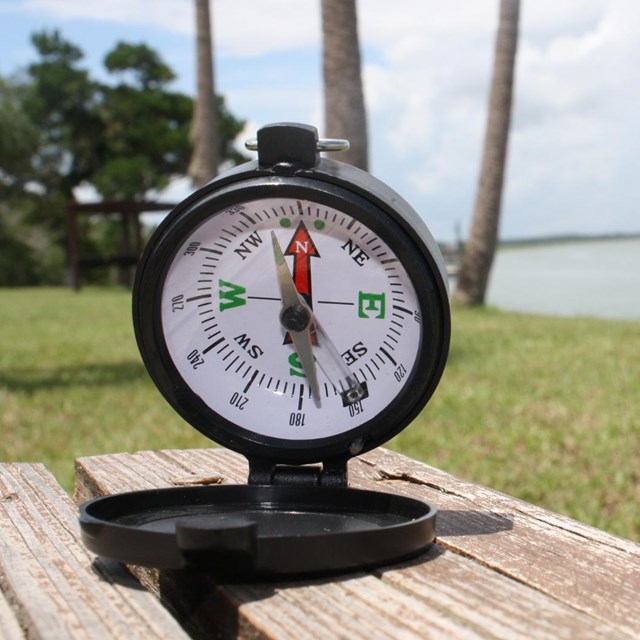Planning a field trip is as easy as 1, 2, 3.1. Pick what type of trip and select the program that is right for your students. 2. Complete the form. 3. Explore our pre and post visit resources. Pick Your Field Trip
Field Trip OpportunitiesFort CarolineLife and Times of the Mocama Show-and-TellThe "Life and Times of the Mocama" education program provides an engaging and comprehensive overview of the Mocama, a group of Native American tribes from the coastal regions of present-day southeastern Georgia and northeastern Florida. This program is designed to educate students on various aspects of Mocama life, culture, and history through a structured, interactive approach. The Mocama (Timucua) thrived in a rich coastal environment that provided abundant resources. They lived in villages along rivers, estuaries, and the Atlantic coastline, utilizing the natural resources for sustenance. The region’s environment, characterized by lush forests, fertile land, and plentiful waterways, supported diverse wildlife and plant life, which the Mocama skillfully harvested through fishing, hunting, and agriculture. In this program, students will travel back in time to the land of Chief Saturiwa before the French and Spanish came. Utilizing replicas of Timucua technology, the Timucua Village exhibit, animal pelts and bones, students will gain insight into Native America of coastal Florida during this interactive program. Highlights include grinding corn into meal, learning about Mocama canoe construction, and learning how to create patterns in clay. Benchmarks Addressed: SS.1.A.2.1-Understand history Tells the story of people and events of other times and places.
Fate of the Fort Guided TourThe "Fate of Fort Caroline" education program is designed to provide an in-depth understanding of Fort Caroline, a French colonial fort located in present-day Jacksonville, Florida. This program covers the fort's historical significance, the events surrounding its establishment, and its impact on the region's history. The program aims to educate participants about the early European exploration and colonization efforts in North America during this guided tour of the visitor center and outdoor exhibit spaces. Special props will be staged in the visitor center to help students imagine what life was like during the 16th century. Benchmarks Addressed: SS.4.A.3.1 Identify explorers who came to Florida and the motivations for their expeditions. Kingsley PlantationVoices of the Silenced Guided TourThe "Voices of the Silenced" education program about slavery and archaeology focuses on uncovering and sharing the stories of enslaved people through archaeological evidence and historical research. This program aims to shed light on the lived experiences of enslaved individuals, often overlooked in traditional historical narratives. Key components of the program include archaeological findings, historical context, and personal narratives. Through the examination of artifacts, structures, and other physical remnants this program provides insights into the daily lives and resilience of enslaved people while touching on the broader historical and socio-economic contexts of slavery, including the transatlantic slave trade, plantation economies, and the legal and cultural systems that supported slavery. During this interactive program, which highlights the personal stories of several enslaved individuals through primary sources, participants will be able to interact with replicas of artifacts found at Kingsley Plantation while receiving a guided tour of the site. Benchmarks Addressed: SS.5.A.4.5 Explain the importance of Triangular Trade linking Africa, the West Indies, the British Colonies, and Europe. Fort George Families Guided TourThe “Fort George Families” guided tour highlights Fort George Island's history, including its Native American origins, European settlement, and development as a plantation in the 18th and 19th centuries. The focus is on the most prominent plantation on the island, owned by Zephaniah Kingsley. Discussions center on Kingsley's life, his enslaved wife Anna Kingsley, and their impact on the plantation and local history. This program encourages reflective and critical thinking on the complexities of history, including issues of slavery, colonialism, and their lasting impacts on society. Benchmarks Addressed: SS.68.AA.2.3 Examine the various duties and trades performed by slaves (e.g., agricultural work, painting, carpentry, tailoring, domestic service, blacksmithing, transportation). Please note:All educational groups need to make a reservation online. Field trips to Timucuan Preserve are free, but are limited to 40 students per program. Larger groups will be asked to reserve multiple field trip days. Restroom facilities, bus parking, a small gift shop, and picnic tables are available at Fort Caroline and Kingsley Plantation. For field-trip related questions you may call and speak with a ranger on Wednesday-Sunday at:
Complete the Field Trip Request FormRequest a ranger-led or schedule a self-guided trip today. Dates will be confirmed by a park representative over e-mail. Complete this form for Kingsley Plantation or Fort Caroline, Ribault Club reservations are made by phone.
NPS Form 10-1750 (Rev. 04/2021) OMB Control No. 1024-0228 NoticesPrivacy Act StatementAuthority: Public Law 114-289 National Park Service Centennial Act and 54 U.S.C. 100701 Protection, interpretation, and research in System. Purpose: To administer education programs for education audiences including but not limited to school groups, scouting groups, extracurricular groups, and home school groups. Routine Uses: To effectively manage requests for education received by the NPS, the Education Reservation Request Form is used to collect basic education reservation information to facilitate operational aspects of scheduling groups for park education programs, including in-park education programs, ranger in classroom programs, and/or online distance learning programs. Disclosure: Voluntary, however, failure to provide the requested information may impede the ability to grant your education reservation request. Paperwork Reduction Act StatementWe are collecting this information subject to the Paperwork Reduction Act (44 U.S.C. 3501) to provide park managers and educators the information needed to schedule and conduct education program activities. All applicable parts of the form must be completed in order for your request to be considered. You are not required to respond to this or any other Federal agency-sponsored information collection unless it displays a currently valid OMB control number. OMB has approved this collection of information and assigned control number 1024-0288. Estimated Burden StatementPublic reporting for this collection of information is estimated to average 5 minutes per response, including the time for reviewing instructions, searching existing data sources, gathering and maintaining the data needed, and completing and reviewing the collection of information. Send comments regarding this burden estimate or any other aspect of this collection of information, including suggestions for reducing this burden, to the Information Collection Clearance Officer, National Park Service, 1201 Oakridge Drive, Fort Collins, CO 80525. Do not send your completed form to this address. Before Your Visit
|
Last updated: December 4, 2025


